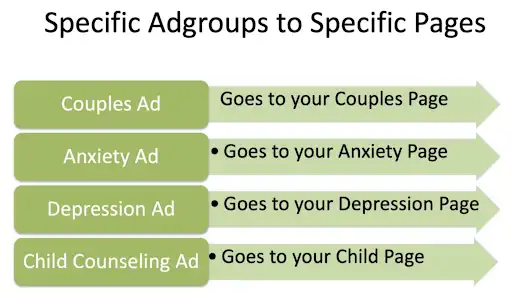Let me tell you about a therapist I recently spoke with—let’s call her Sarah. Sarah was at her wit’s end after spending thousands of dollars on Google Ads with little to show for it. She had followed the advice of so-called “experts” and was ready to throw in the towel.
Sarah’s story isn’t unique. Many therapists find themselves overwhelmed by conflicting advice on how to run successful Google Ads campaigns. I’m here to debunk some of the worst advice out there and help you avoid Sarah’s mistakes.
Bad Google Ads Advice And What To Do Instead

Advice: “Start Google Ads as soon as you have a starter site up because it takes 90 days for your campaign to start working.”
Why It’s Bad:
Running Google Ads before your website is fully optimized to convert traffic is like pouring money down the drain. If your site isn’t ready to engage visitors and turn them into clients, you’re wasting your Ad spend.
What To Do Instead:
Ensure your website is “Ads Ready” before launching any Google Ads campaign. This means having strong specialty pages for each Adgroup, clear calls to action, and a professional presentation. When your site is prepared, your initial 90 days of ad spending will yield much better results.

(By the way, we can review your site to determine if it’s ready for ads – for free.)
Advice: “Try Google Ads on your own first. If it looks positive, then pay someone else to improve it for you.”
Why It’s Bad:
Attempting to build your own Google Ads campaign without the necessary experience and skill is setting yourself up for failure. It’s like telling a client, “Go talk to your friends about your trauma first, and if that helps, then consider therapy.”
Would you ever dream of doing that? No.
What To Do Instead:
Successful Google Ads campaigns require expertise. If you lack the experience, get professional help from the start. To give you a taste of what’s involved, watch this video. It’s one of the better “how to” guides out there, but keep in mind, several of its suggestions might work for plumbers but could blow through a therapist’s Ads budget in no time.
Nonetheless, watch it to understand the complexity and detail involved in running a successful campaign. Remember, a poorly set-up campaign won’t bring the results you need.
Advice: “You can just rely on Google Ads Expert Setup or Smart Campaigns to get a campaign set up for free!”
Why It’s Bad:
Relying on Google Ads Expert Setup or Smart Campaigns might sound appealing, but it’s a trap. Google Ads reps are notorious for setting up campaigns that burn through your budget with little to no return on investment.
What To Do Instead:
Re-read everything I mentioned in the previous section. It all applies here too. Google Ads reps are great at helping you spend your money quickly, but not at ensuring you get any real value from it. To get the results you need, work with a professional who understands the nuances of Google Ads specifically for therapy practices.
Advice: “Once your ads are running, you should accept all of Google’s auto adjustments to your campaign so that you achieve a high Optimization Score.”
Why It’s Bad:
Google’s recommendations are designed to make Google money, not you. Almost none of them will help you! Some people will even tell you that having a low Optimization Score will hurt how Google displays your ads. Don’t fall for this trap!
What to Do Instead:
The Optimization Score has no direct impact on your Ad performance. It’s a metric Google uses to encourage you to spend more. Don’t believe me? Listen to the first 21 seconds of this video: YouTube Link (also at the end of this section!).
This point is also emphasized in the video training I shared earlier. Get your campaign built by a professional and then trust it. Make adjustments based on performance data, not Google’s suggestions.
Advice: “You should pay no more than $XXX/month on your campaign or you’re paying too much!”
(Or – even better):
“You should never pay more than $YY/click or you’re paying too much.”
Why It’s Bad:
The short story: Without analyzing your campaign and ROI, you cannot judge a monthly budget or a cost per click as being too high, too low, or just right.
That’s like saying someone is too tall. Compared to what? That height could be the best thing ever if they’re a pro basketball player. If they’re a horse jockey, not so much.
What To Do Instead:
Google Ads cost per click varies, not only by city and specialty, but also by how good (i.e., specific) the traffic is. For instance, if someone is paying $1.50/click for the term “anxiety” or “symptoms of anxiety,” that is cheap but it’s still terrible traffic. Hardly any of that traffic will convert to clients, so even if you’re only paying $1.50/click, you’re paying too much.
Conversely, if you are paying $7/click for traffic that comes in for “anxiety therapy” or “anxiety counseling,” that’s really good traffic, and many more of those visitors will convert to actual clients.
You need to be careful about comparing click prices with others’, not knowing what kind of traffic their campaign brings them.
Let’s determine your Lifetime Value of a client. Imagine they come to therapy 4 times per month and they stay for 6 months. Let’s say you charge $100/session. That means a client’s LTV (lifetime value) is $2400.
If you’re spending $700/month (100 clicks x $7), and you get just one client per month, that $700 earns you $2,400. Your campaign is working really well!
I’d give you $700/month if you gave me $2400 back—all day, every day.
So, bottom line, you can never say $7 is not affordable. You have to look at what it’s generating in terms of clients.
Let’s Talk About Your Needs
I know how frustrating it can be to navigate the world of Google Ads. But you don’t have to do it alone. Schedule a call with one of our team members to discuss your specific needs and how we can help you create a successful Google Ads strategy.
Prior to your call, feel free to check out our Google Ads Services.
We’re here to support you and help you grow your practice.

